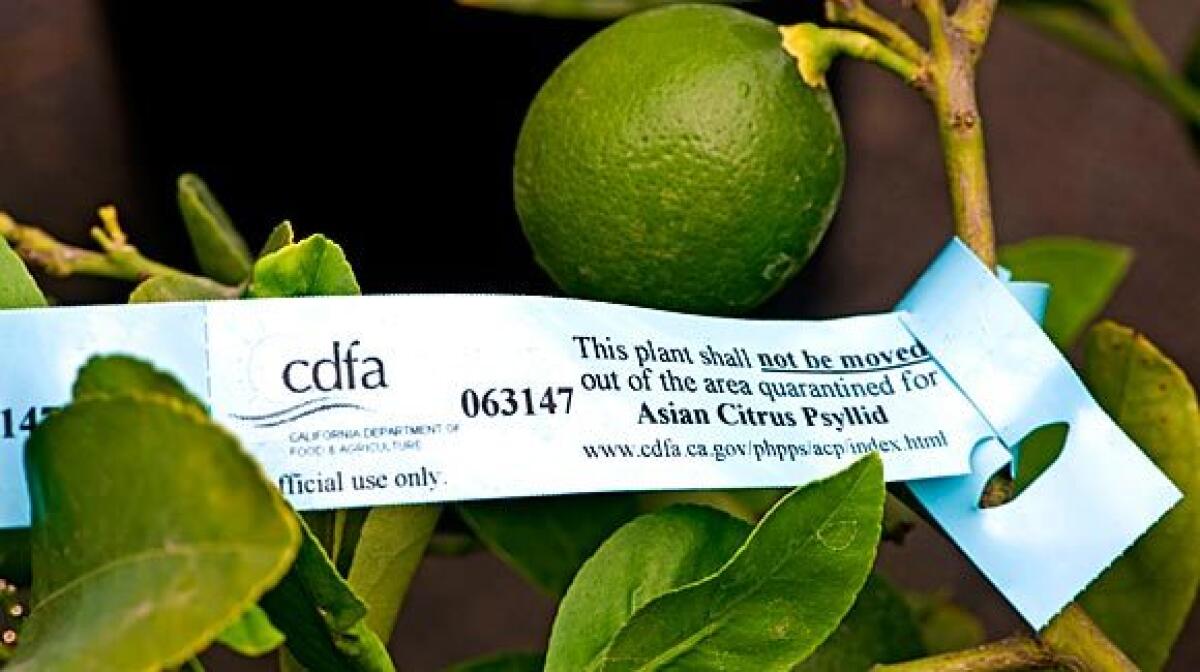Health authorities act to contain bacterial threat to citrus trees

- Share via
A month after the discovery of Asian citrus psyllids in Santa Ana and Echo Park, state and county plant health authorities are scrambling to implement new regulations for citrus growers who sell at farmers markets in affected areas.
The measures are designed to contain the psyllid, a tiny insect that could transmit huanglongbing, a bacterial disease deadly to citrus trees; the disease has not yet appeared in California but has devastated groves in Florida and around the world.
To protect against the psyllid, there is a quarantine in effect that restricts the movement of citrus trees and fruit in Los Angeles and Orange counties, southern San Diego County, western Imperial County and a small portion of Riverside County near the Salton Sea that restricts the movement of citrus trees and fruit from those areas.
Most citrus for sale at Southern California farmers markets comes from areas outside the current quarantine, including the San Joaquin Valley, Ventura County, northern San Diego County and most of Riverside County.
Because psyllids feed on citrus leaves and stems, those parts are the primary focus of concern. Vicki Bernard, who grows citrus in Riverside and Valley Center, says she was told by the California Department of Food and Agriculture that to continue selling citrus at Los Angeles County farmers markets she would need to strip off all such green matter, as well as make sure the fruit was free from dirt and debris. “That’s a little bit of extra work, but no big deal,” she says.
Actually, selling citrus with stems and leaves attached, which some buyers prefer because green leaves indicate freshness, will be allowed to continue but with a significant catch. Bob Polito, who grows in Valley Center and Pauma Valley, outside the quarantine area, says he is allowed to bring such fruit from his farms into quarantine districts such as Los Angeles, but he is not allowed to take that fruit back to his farm afterward for fear it may have picked up psyllid hitchhikers. That means any fruit that goes unsold at the market would have to be either stripped, or discarded.
Polito says that might be practical when he’s selling at smaller markets, but it would be too much trouble at big markets such as Santa Monica, where he will probably bring stem-and-leaf fruit only on special order.
State plant health authorities have been discussing whether to require growers to remove the calyxes, the little buttons where stems are attached to fruits. Doing so shortens the fruit’s shelf life and would be a major problem for sellers of mandarins, which typically are clipped from trees rather than picked, in order to prevent tearing the delicate peel around the button. Fortunately, the current rule is that as long as stems are clipped close, the buttons can stay, says Steve Lyle of the CDFA.
Nursery growers of citrus and closely related trees are the most seriously affected by the new regulations, since they can’t move those trees from a quarantine to a non-quarantine district. In addition, quarantined nursery growers won’t be able to raise organic citrus trees any more, since they have to be treated with insecticides.
Jimmy Williams of Hayground Organic Gardening, who sells at the Hollywood and Santa Monica farmers markets, said that last week inspectors from the CDFA visited his growing grounds in Silver Lake to treat his citrus and related plants with systemic insecticides, which are injected into the ground and absorbed through the roots. These plants included potted curry trees, a citrus relative from which the leaves are used as a spice. The inspectors told him all the plants would need to be treated every three months.
Having his plants treated is unfortunate, but “this is absolutely necessary,” he said. “If you understand the danger that’s being posed by this insect, you have to do it.”
More to Read
Eat your way across L.A.
Get our weekly Tasting Notes newsletter for reviews, news and more.
You may occasionally receive promotional content from the Los Angeles Times.










